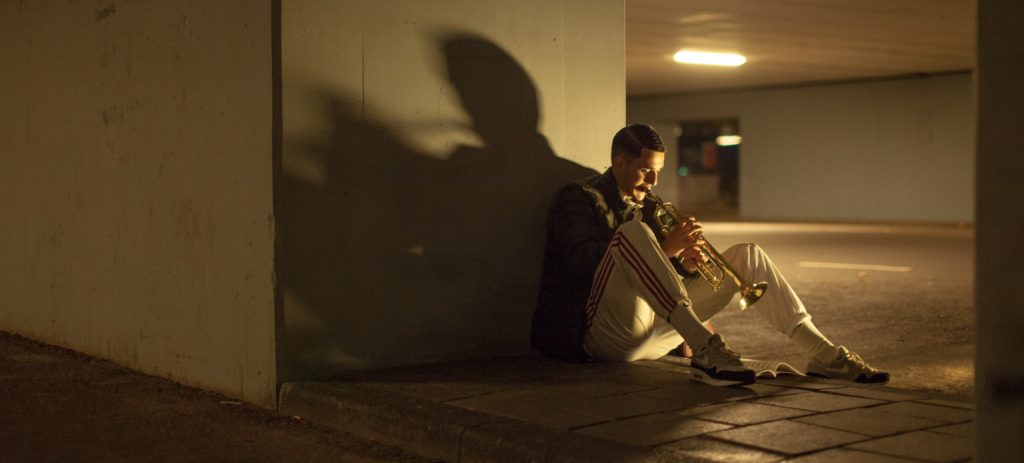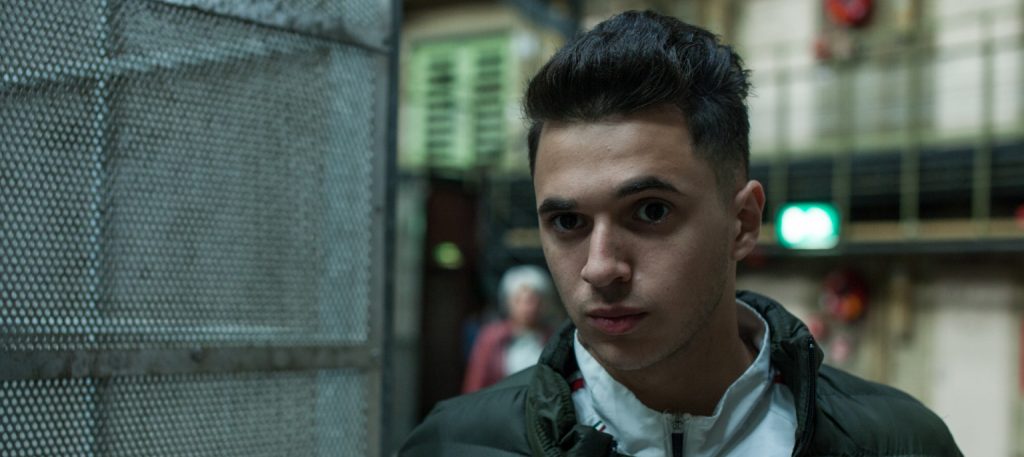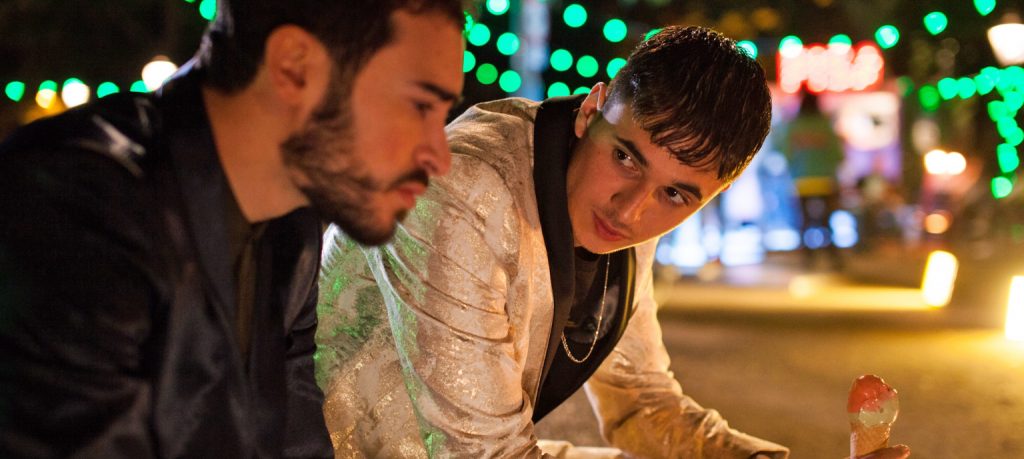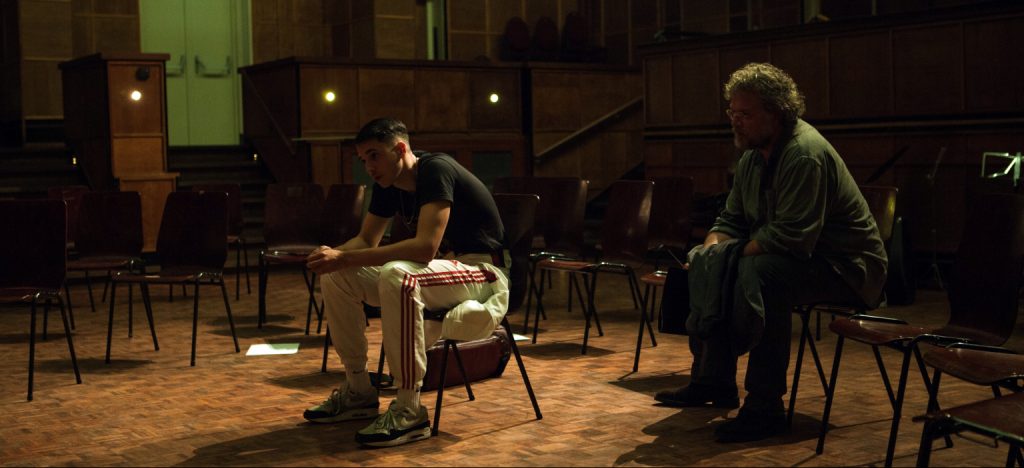The Promise (2019).
Amsterdam was abuzz with excitement when The Promise of Pisa (directed by Norbert ter Hall) was released a few months ago. It’s an adaptation of a novel-cum-memoir written by a local figure named Mano Bouzamour, a Dutch-Moroccan columnist. Bouzamour is a hometown guy born here in 1991, and the translation of his 2014 bestseller to the screen was seen as a benchmark of success for a member of a minority group which hasn’t always had the easiest time assimilating into Western Europe.
The promise of the title is one made by young Samir (or “Sam” as he’s known to his white friends) to his older brother, which is that he’ll ply his adulthood with a degree instead of petty/grand larcenies. Sam idolizes his brother, a slick hood who zips around the north of the city on a Vespa scooter in between shaking people down. In fact, the movie kicks off with the inciting incident of a truck holdup right out of Goodfellas, in which older brother Mo brandishes an automatic weapon during a night of living dangerously. Moments after that promise is made, the local constabulary nick Mo and his cohort in front of Sam, scaring the kid straight.

Here’s the thing about the young protagonist, he has a gift for playing the trumpet, a rarity in his downtrodden neighborhood of Moroccan-Dutch working poor. It’s his ticket out of the doldrums, but he risks separation from the traditional North African culture in which he’s grown up, and assimilation into White Amsterdam.
In fact, the trumpet Sam plays was stolen from a nearby gentrifier, a band teacher at the tony music academy in south Amsterdam which Sam has his eye on. Expertise is his ticket to class mobility, a la Saturday Night Fever, Good Will Hunting, or Whiplash. This is well-worn material to be sure, but there’s something new about watching a heretofore racially-unseen narrator tell the tale in a city I’m still largely unfamiliar with.

However, rather than extol the virtues of a smart film made with plenty of clever moves, I’m going to cut to the part where I lament the filmmakers’ choice to root the story in so many familiar clichés along the way to ultimately getting Sam where we expected he would be from the outset. Sam has difficulties fitting in; he acts out, he gets tossed; he befriends the nerdy wealthy ginger who picks on him; he scores the white upper-class white girl he’s fixated upon; brother Mo gets released from the slammer with a fervor for fundamentalist Islam, and so on. There are few surprises, which is too bad.
The cast is primarily comprised of young actors playing high schoolers, and with the exception of lead actor Shahine el Hamus (Sam) they are gifted performers. The character of Annelies, Sam’s girlfriend, is played by a young Amsterdammer named Olivia Lonsdale who is already a canny veteran actor at a young age. I found myself wishing that el Hamus was her match as Sam, because it doesn’t seem like much of a believable pairing otherwise.

I’m going to assume that the filmmaking team felt they had done their damnedest to make the story gritty — which they largely succeed at — but grit doesn’t equal originality. The one thing which hints at a larger world is a night of sexual experimentation among Sam, Annelies, his ginger male buddy IJsbrand (that is an actual name here!), where Sam and IJsbrand tongue-kiss in the spirit of the moment — very 2019 of them. There wasn’t much more of that paradigm-busting at play, and it could’ve benefited from further boldness.
I think audiences want something which feels real enough with elements of life-affirming uplift, and this movie certainly provides that. Amsterdam looks marvelous on film, and I’m always shocked it doesn’t appear in cinemateks more often, but I suspect that has to do with the logistic difficulty of shooting in an 18th century street grid among the economic One Percent of continental Europe. Like most world capitals, this place is a microcosm for everything which can happen in the course of a day, so there’s no shortage of human drama to put a lens to.

The travails of Samir Zafar, a young person caught between the old world model of his family and the polyglot reality of Amsterdam, is an evergreen story which recommends its telling over and over and would be even more interesting if maybe, occasionally, the protagonist’s gender could be flipped. I’ve seen enough male bildungsromans to last a whole life long (hello Boyhood!), and could stand to see what life is like for a female person in the same position.
Film ’89 Verdict – 6/10
The Promise (also known as The Promise of Pisa, or De Belofte van Pisa to give its Dutch title) is not available to stream or rent, although that may change in the near future.

